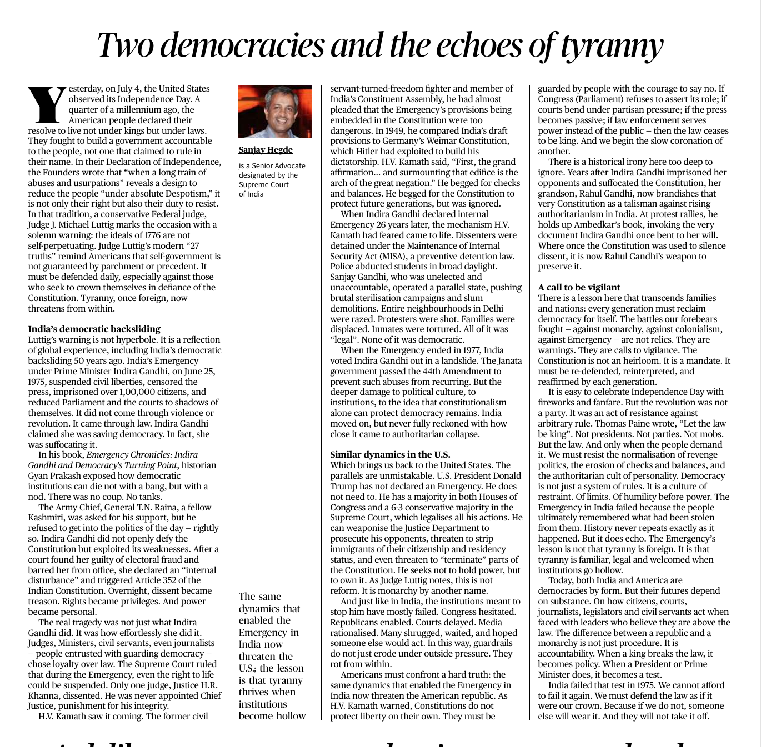1. Context
- Written on July 4, U.S. Independence Day, the editorial draws parallels between India and the U.S. in defending democracy from internal authoritarian threats.
- Uses historical parallels like India’s Emergency (1975) and present-day warnings against majoritarian misuse of power in both countries.
⚖️ 2. India’s Democratic Backsliding
- Emergency in India (1975) imposed by Indira Gandhi after being found guilty of electoral fraud.
- Press censored, opposition jailed, civil liberties suspended.
- 100,000+ people imprisoned under Maintenance of Internal Security Act (MISA).
- Press censored, opposition jailed, civil liberties suspended.
- Constitutional machinery misused to declare “internal emergency” for political survival.
📜 3. Parallels with the U.S.
- Judge Luttig’s warning on July 4, 2024, on potential “end of democracy” due to populism and rejection of constitutional norms in the U.S.
- Fear of institutional erosion and rise of executive dominance echoes India’s experience in 1975.
- S. Supreme Court now heavily tilted towards right; parallels with institutional capture.
🧠 4. Lessons from Emergency & Authoritarianism
- Democracy is not self-preserving; it must be guarded constantly.
- India’s example shows:
- Authoritarian drift can be reversed, but only when people and institutions resist.
- Judiciary’s delayed response in 1975 was a historic failure (ADM Jabalpur case).
- Authoritarian drift can be reversed, but only when people and institutions resist.
- Freedom must be vigilantly defended through institutional checks and active citizenry.
📢 5. Warning Signs in Democracies Today
- Suppression of dissent, concentration of power, disinformation campaigns, and control over media/institutions are red flags.
- Amendments (e.g., 42nd Constitutional Amendment) post-Emergency aimed at curbing democratic space.
✊ 6. Call to be Vigilant
- Democracy thrives when:
- Separation of powers is respected.
- Rule of law and independent judiciary function effectively.
- People and institutions say ‘no’ to power misuse.
- Separation of powers is respected.
- Authoritarianism starts subtly: slow erosion of norms, not always with coups or violence.
📌 UPSC Mains GS Paper II Question (2025-style)
Q. “Democracy is not self-perpetuating; it must be actively defended.” In light of this statement, critically examine how India’s experience with Emergency (1975) offers vital lessons for defending democratic institutions today. (15M, 250 words)


